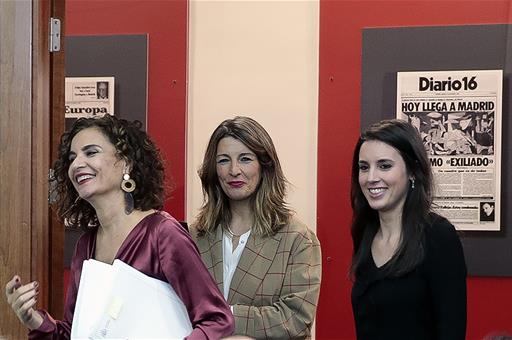Council of Ministers
Government repeals law protecting dismissals on justified medical grounds
Council of Ministers - 2020.2.18
Moncloa Palace, Madrid
The Council of Ministers approved a Royal Decree-Law that repeals the current Article 52 of the Workers' Statute on the termination of employment contracts on objective grounds, which allows dismissals for continuous non-attendance at work despite medical justification.
The Minister for Work and Social Economy, Yolanda Díaz, claimed that this rule constitutes an anomaly compared with European labour law, as different courts in our country, and even the Court of Justice of the European Union, have ruled on this, warning of the need to amend it due to its discriminatory nature back in 2018.
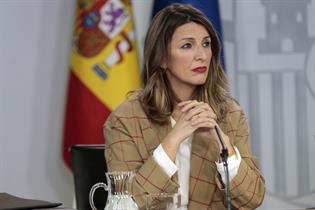 Pool Moncloa/JM CuadradoYolanda Díaz stressed that, by repealing this article, enhanced legal certainty is given to workers - particularly those who suffer from some form of disability, chronic disease or long-term illness, or those engaged in providing long-term care - and brings to an end the social alarm caused by the possibility of losing one's job at a time of great vulnerability, "when as well as being concerned over getting better the enormous real risk of being dismissed from work weighs heavily".
Pool Moncloa/JM CuadradoYolanda Díaz stressed that, by repealing this article, enhanced legal certainty is given to workers - particularly those who suffer from some form of disability, chronic disease or long-term illness, or those engaged in providing long-term care - and brings to an end the social alarm caused by the possibility of losing one's job at a time of great vulnerability, "when as well as being concerned over getting better the enormous real risk of being dismissed from work weighs heavily".
The minister pointed out that the measure, contained in the coalition government agreement, maintains the right to health, promotes health and safety at work, and complies with the goal of promoting decent work contained in the 2030 Agenda.
The repeal will come into force when published in the Official State Gazette with no retroactive effects.
New taxes to modernise fiscal system
The Council of Ministers approved, for their passage through Parliament, two draft laws that provide for the creation of the Tax on Financial Transactions and the Tax on Certain Digital Services.
The Minister for the Treasury and Government Spokesperson, María Jesús Montero, argued that Spain needs to move towards a "fairer and better distributed" fiscal system in line with our peer countries and backed by the EU authorities. To this end, she underlined that "Spain, as a modern and advanced nation, cannot allow its tax system to be anchored in the previous century".
María Jesús Montero stressed that technological development offers new business opportunities which require the tax system to be adapted to avoid unfair competition between "traditional businesses" and digital businesses. The government, she claimed, will make this transformation to the digital system "in the certainty that it will not raise taxes on the middle classes, the working classes, the self-employed or SMEs".
The government argues that "there can be no social justice without fiscal justice", and hence, according to the Government Spokesperson, we must maintain a tax system in which "those who have the most contribute the most".
Tax on Financial Transactions
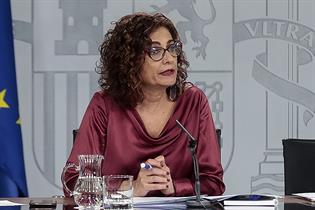 Pool Moncloa/JM CuadradoMaría Jesús Montero declared that this tax strengthens the principle of the equality of the tax system and is levied on operations that are not subject to taxation at this time. Furthermore, she specified, this affects the financial sector which received a major economic injection from the public authorities during the crisis. "It is in application of the principle of social justice that this sector should now contribute more heavily to maintaining public services".
Pool Moncloa/JM CuadradoMaría Jesús Montero declared that this tax strengthens the principle of the equality of the tax system and is levied on operations that are not subject to taxation at this time. Furthermore, she specified, this affects the financial sector which received a major economic injection from the public authorities during the crisis. "It is in application of the principle of social justice that this sector should now contribute more heavily to maintaining public services".
This is an indirect tax levied at the rate of 0.2% on transactions for the acquisition of shares in Spanish listed companies with stock market capitalisation of more than 1 billion euros, and hence will not affect the field of action of SMEs.
The tax, specified María Jesús Montero, will be levied on the financial intermediary that executes the purchase order. The government estimates that 850 million euros will be collected annually by way of this tax.
Tax on Certain Digital Services
The Tax on Certain Digital Services seeks to tax operations in the digital economy which do not currently fall under the tax system.
María Jesús Montero reiterated that the government is committed to achieving an international consensus on this tax - through the framework of the OECD and the G-20 - and is working so that, once achieved, Spain can adapt its legislation. In turn, she highlighted that countries such as France, Italy and the United Kingdom have approved or presented proposals for taxes on certain digital services.
The aim is to levy a 3% tax on services in which an essential contribution from users exists in the process of creating value for the company that provides the services. Three concepts are applied: the provision of online advertising services, online intermediation services, and the sale of data generated through information provided by the user.
This tax figure will affect companies that have turnover in excess of 750 million euros worldwide and with income affected by the tax that exceeds 3 million euros in Spain, regardless of the origin of the company.
The minister added that the settlement of this tax will lead to the collection of some 968 million euros. In the first year, the declaration of income will not be made until at least 20 December 2020. This decision, she clarified, gives greater leeway to reach an international agreement on the tax and will help facilitate the adaptation of companies to the new tax.
Digital transformation of financial system
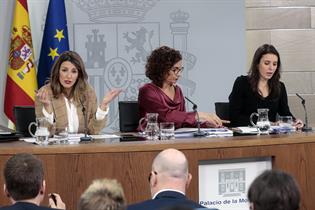 Pool Moncloa/JM CuadradoThe Council of Ministers agreed to present the draft law on the creation of a sandbox, or controlled environment for testing, for its passage through Parliament, with the aim of accompanying the digital transformation of the financial system with a full legal and supervisory regulatory framework.
Pool Moncloa/JM CuadradoThe Council of Ministers agreed to present the draft law on the creation of a sandbox, or controlled environment for testing, for its passage through Parliament, with the aim of accompanying the digital transformation of the financial system with a full legal and supervisory regulatory framework.
María Jesús Montero reported that the initiative ensures that technological changes do not affect the protection of consumers of these services, the stability of the financial environment or market integrity.
Trust services for electronic transactions
The government also approved, for its passage through Parliament, the draft law regulating certain aspects of trust services for electronic transactions, with the aim of adapting EU Law to the Spanish legal system and of strengthening legal certainty.
The Minister for the Treasury stated that the law refers to such services as electronic signatures and stamps for natural and legal persons, and the electronic time stamp, which are habitually used in electronic relations between citizens, companies and public authorities.
She also indicated that Spain is the European Union country with the largest number of qualified services providers, including the Spanish Mint.
Statement on equal pay
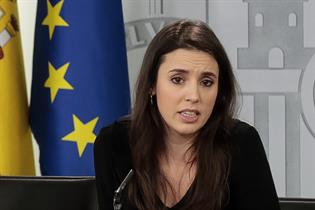 Pool Moncloa/JM CuadradoThe government approved an institutional statement on the occasion of Equal Pay Day to be commemorated on Saturday, 22 February.
Pool Moncloa/JM CuadradoThe government approved an institutional statement on the occasion of Equal Pay Day to be commemorated on Saturday, 22 February.
The Minister for Equality, Irene Montero, called for men and women to be paid equal pay for equal work and to bring an end to discrimination as a result of the wage gap for women.
Irene Montero explained that the current differences in pay are not limited to active work, but also extend to pensions, in which they are even more noteworthy, since it is predominantly women who perform caring tasks, which are "invisible and unpaid", and hence they do not make National Insurance contributions or contribute less to their retirement. That is why "a necessary debate should now be opened on care tasks and the use of time".
Male violence
The minister expressed the government's condolences over the new case of male violence confirmed on Tuesday in Alicante, which brings the number of mortal victims to 11 so far this year. Irene Montero reiterated the government's firm commitment to use all available public resources to ensure that "not one more woman is murdered".
Irene Montero expressed her confidence in women coming out on to the streets again on Women's Day on 8 March against male violence and for a fairer, more sustainable and more feminist country.
Toledo Pact
The Government Spokesperson referred to the meeting of the Monitoring and Evaluation Committee of the Toledo Pact agreements held in the Lower House of Parliament.
On this matter, she reiterated that the government firmly believes in the feasibility of the pension system and is committed to reaching a broad basic agreement that guarantees that pensioners will not lose purchasing power and that workers will have a decent pension in the future.
European Council: CAP and cohesion funds
At a European level, the government will advocate that the future Common Agricultural Policy (CAP) maintains the same budget as in the period 2015-2020. The Government Spokesperson explained that this is what the President of the Government, Pedro Sánchez, will convey to the extraordinary European Council that will meet in Brussels on Thursday.
María Jesús Montero pointed out that "agricultural policy is an absolute priority for Spain", since 30% of the average income of farmers and livestock breeders in our country comes from these European funds, and hence they are crucial for their stability and sustainability.
Spain's second priority at the Council meeting will be to defend the cohesion funds, so that they allow for real convergence of European regions, since "a Europe at two or three different speeds would mark the end of the European project", said the Government Spokesperson
María Jesús Montero remarked that the President of the Government will also express the need for Europe to consider aspects that are necessary in its accounts to become a global benchmark, such as youth employment, training for digitalisation, the just transition, support for research and innovation.
Current affairs
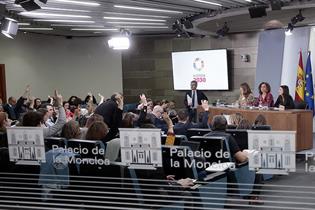 Pool Moncloa/JM CuadradoThe Government Spokesperson claimed that the government "has listened" to the claims made by the primary sector and is working to lay the foundations that allow them to obtain fair prices and for their work to be socially acknowledged. Among the initiatives announced in recent days, she outlined the amendment of the Food Chain Act; the reform of the system for labourers for temporary agricultural workers, and the defence of the strict application, to products from third countries, of EU Law on food security, the use of phytosanitary products, waste and pest control.
Pool Moncloa/JM CuadradoThe Government Spokesperson claimed that the government "has listened" to the claims made by the primary sector and is working to lay the foundations that allow them to obtain fair prices and for their work to be socially acknowledged. Among the initiatives announced in recent days, she outlined the amendment of the Food Chain Act; the reform of the system for labourers for temporary agricultural workers, and the defence of the strict application, to products from third countries, of EU Law on food security, the use of phytosanitary products, waste and pest control.
María Jesús Montero also referred to the figures on the public debt for year-end 2019 published on Tuesday by the Bank of Spain, welcoming the results: Spain closed 2019 with a level of debt equivalent to 95.5% of its GDP, a bigger drop than the target of 95.9% it had communicated to Brussels back in October. The largest decrease in more than a decade - down 2.1% - has been achieved between 2018 and 2019.
The Government Spokesperson and Minister for the Treasury claimed that the government is proving that it is possible to reduce the public deficit and debt whilst strengthening the Welfare State and recovering workers' rights.
Non official translation





